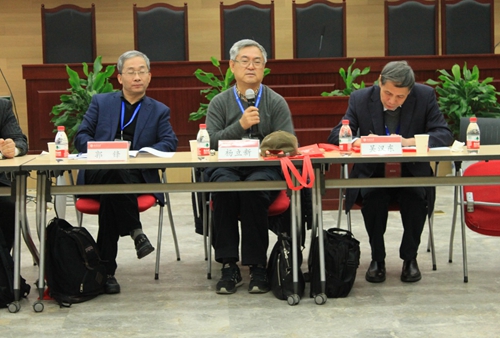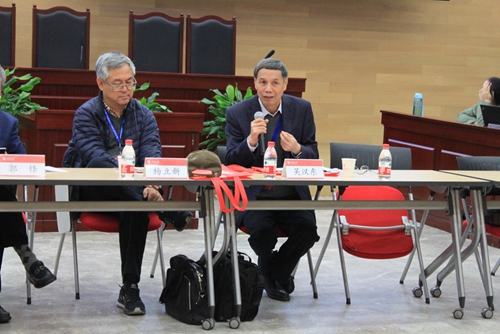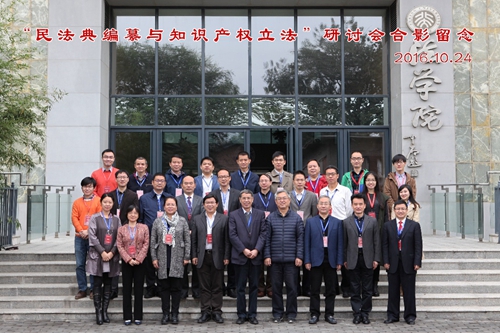You are here: Home»
News»
Global»
Civil Code Compilation and Intellectual Property Legislation Seminar Held Successfully
Civil Code Compilation and Intellectual Property Legislation Seminar Held Successfully
Date:2016-10-27
The compilation of the Civil Code is a huge project of the rule of law construction in China. How to set up intellectual property law in the future Civil Code is an unavoidable topic in legislation and academic research. Thus the International Intellectual Property Research Center of Peking University, the Civil and Commercial Law Science Research Center of Renmin University of China and the Intellectual Property Research Center of Zhongnan University of Economics and Law jointly organized the Seminar on "Civil Code Compilation and Intellectual Property Legislation" on October 24, 2016 morning at Koguan Building Moot court of PKULS. Nearly 30 guests from the Supreme People's Court of the People’s Republic of China, the Chinese Academy of Social Sciences, the China Law Society, the State Intellectual Property Office, the National Judges College, Peking University, Tsinghua University, Renmin University of China, China University of Political Science and Law, Nanjing University, Nanjing Normal University, Shaanxi Normal University and other units were present at the meeting and have heated discussion. The seminar was divided into three stages: the opening ceremony and the speech of the leader, keynote speech and roundtable discussion.
The Phase of Opening Ceremony and Leadership Speech were chaired by Prof. Wu Handong, Director of the Center for Intellectual Property Studies of Zhongnan University of Economics and Law. Mr. Zhang Yonghua, Director of the Law Department of the State Intellectual Property Office, Mr. Guo Feng, Deputy Director of the Supreme People's Court and Mr. Li Shichun, Director of the Research Department of the Law Society of China respectively gave speech. Subsequently, the seminar got into the second stage and keynote speech stage. The second stage was chaired by Prof. Yao Hui, Executive Director of the Center for Civil and Commercial Law and Science of Renmin University of China. Prof. Yang Lixin, Director of the Center for Civil and Commercial Law Science Research of Renmin University of China, Prof. Yi Jiming, Director of International Intellectual Property Research Center of Peking University and Prof. Wu Handong gave keynote speech.
The keynote speech of Prof. Yang Lixin is entitled "Derivatives in the civil law data and data exclusive rights." He pointed out that legislation and theoretical research were two levels of the problem: Legislation should pay attention to seeking common ground while reserving differences and the harmonization of various mixed views, but theoretical research can be unique. He argued that Article 108 of the Draft Civil Code, considered in June 2016, did not imply that information and data was an object of intellectual property. Information and data should not be regarded as fully compatible concepts, especially in civil law. Information was differentiated from one another. It was necessary for civil law research to define these concepts in more details. However, as a whole, the exclusive right of data as a civil rights under the new situation was still very important for the acceptance of the general principles of civil law, it can reflect the civil law for the development of social practice response.
The Phase of Opening Ceremony and Leadership Speech were chaired by Prof. Wu Handong, Director of the Center for Intellectual Property Studies of Zhongnan University of Economics and Law. Mr. Zhang Yonghua, Director of the Law Department of the State Intellectual Property Office, Mr. Guo Feng, Deputy Director of the Supreme People's Court and Mr. Li Shichun, Director of the Research Department of the Law Society of China respectively gave speech. Subsequently, the seminar got into the second stage and keynote speech stage. The second stage was chaired by Prof. Yao Hui, Executive Director of the Center for Civil and Commercial Law and Science of Renmin University of China. Prof. Yang Lixin, Director of the Center for Civil and Commercial Law Science Research of Renmin University of China, Prof. Yi Jiming, Director of International Intellectual Property Research Center of Peking University and Prof. Wu Handong gave keynote speech.
The keynote speech of Prof. Yang Lixin is entitled "Derivatives in the civil law data and data exclusive rights." He pointed out that legislation and theoretical research were two levels of the problem: Legislation should pay attention to seeking common ground while reserving differences and the harmonization of various mixed views, but theoretical research can be unique. He argued that Article 108 of the Draft Civil Code, considered in June 2016, did not imply that information and data was an object of intellectual property. Information and data should not be regarded as fully compatible concepts, especially in civil law. Information was differentiated from one another. It was necessary for civil law research to define these concepts in more details. However, as a whole, the exclusive right of data as a civil rights under the new situation was still very important for the acceptance of the general principles of civil law, it can reflect the civil law for the development of social practice response.

The keynote speech of Prof. Yi Jiming is entitled "Deconstruction of the Civil Code and intellectual property into the model." He pointed out that in the reconstruction of the code after the "deconstruction of codification", intellectual property played a role both in the deconstruction of the code and in the reconstruction of the code as an important part of the civil code and could, and should, be entered in a holistic manner Civil Code. He exemplified the impact and deconstruction of intellectual property rights on the dual structure of traditional civil law and analyzed the significance of the construction of the Code of Principles of the Code of Civil Law and the development path of its openness and times, and mentioned the construction of Ternary Legal Norm System of Property Right in the Civil Code "Absolute Right", "Transfer and Permission to Use" and "Civil Liability". At the same time, he explained the main difficulties in the entry of intellectual property, such as the handling of procedural norms or administrative norms, the frequent problems of intellectual property rights repair activities, the phenomenon of overlapping bed racks, and so on, and proposed solutions. In addition, he proposed that the overall entry of intellectual property law into the civil code was dialogue of the strengthening between civil law and intellectual property law and an opportunity to temper the growth of each other and to enrich the civil law theory.

The keynote speech of Professor Wu Handong is entitled "Codification and Intellectual Property Law" into the Code. He first of all revealed how countries around the world deal with the relationship between intellectual property law and civil law status and reasons through the comparison of history study of laws, emphasized that the development of the Chinese Civil Code must proceed from the local conditions and critically learn from foreign experience. The establishment of Chinese Civil Code should learn from the Chinese civil law of intellectual innovation and the development of the law of China's civil code. He also pointed out that intellectual property rights could wait for the codification process, but must not be overlooked. The civil code of the 21st century could not rest on its laurels. It should have the character of the times, make some breakthroughs and make progress. On the overall migration of intellectual property into the Code and point-surface link mode selection, Professor Wu Hantong pointed that link was more suitable for China's current national legislation. This means, to establish principle rules in the general principles of intellectual property as the point of the link, and set up a single edition of intellectual property rights in the sub-rules, and set the general provisions of intellectual property rights.

Prof. Yang Lixin, Prof. Yi Jiming and Prof. Wu Handong delivered three keynote speeches, representing three different cognitive perspectives and legislative observations in the process of compiling the Civil Code. The third phase of the roundtable discussion focused on these three perspectives. The roundtable discussion was chaired by Prof. Hu Kaizhong, Deputy Director of Center for Intellectual Property Studies, Zhongnan University of Economics and Law. Prof. Guo Feng, Deputy Director of Supreme Court Research Office, Prof. Fei Anling and Prof. Feng Xiaoqing of China University of Political Science and Law, Xie Hongfei and Guan Yuying, Researchers of the Chinese Academy of Social Sciences, Prof. Yang Ming and Associate Prof. Liu Dongjin of Peking University Law School, Associate Prof. Cui Guobin, Tsinghua University Law School, Prof. Li Chen, Associate Prof. Yao Huanqing, Renmin University of China Law School, Associate Prof. Xiao Zhi Yuan, Associate Prof. He Hua, Zhongnan University of Economics and Law and Associate Prof. Zhang Songlun of Nanjing Normal University School of Law also gave their speeches, and delivered unique views on the theme of the symposium.
There was warm discussion and harmonious atmosphere in this symposium. Participants got consensus in some issues, deepened understanding, and achieved complete success.
There was warm discussion and harmonious atmosphere in this symposium. Participants got consensus in some issues, deepened understanding, and achieved complete success.

The symposium jointly organized by the three research centers represented four research bases, national intellectual property strategy implementation research bases of Peking University and Zhongnan University of Economics and Law, key research of humanities and social sciences of Ministry of Education bases of Renmin University of China and Zhongnan University of Economics and Law. The conference organizer was Peking University International Intellectual Property Research Center. Peking University Law School graduate student Cai Yuanzhen, Huang Xiaosu, Yi Tao, Sheng Xingyu, Cao Yuan, Qin Yang and Zeng Tian also provided the organization and service work of the meeting.
Translated by: Yang Wanyi
Edited by: Zhou Wenhao
Translated by: Yang Wanyi
Edited by: Zhou Wenhao



